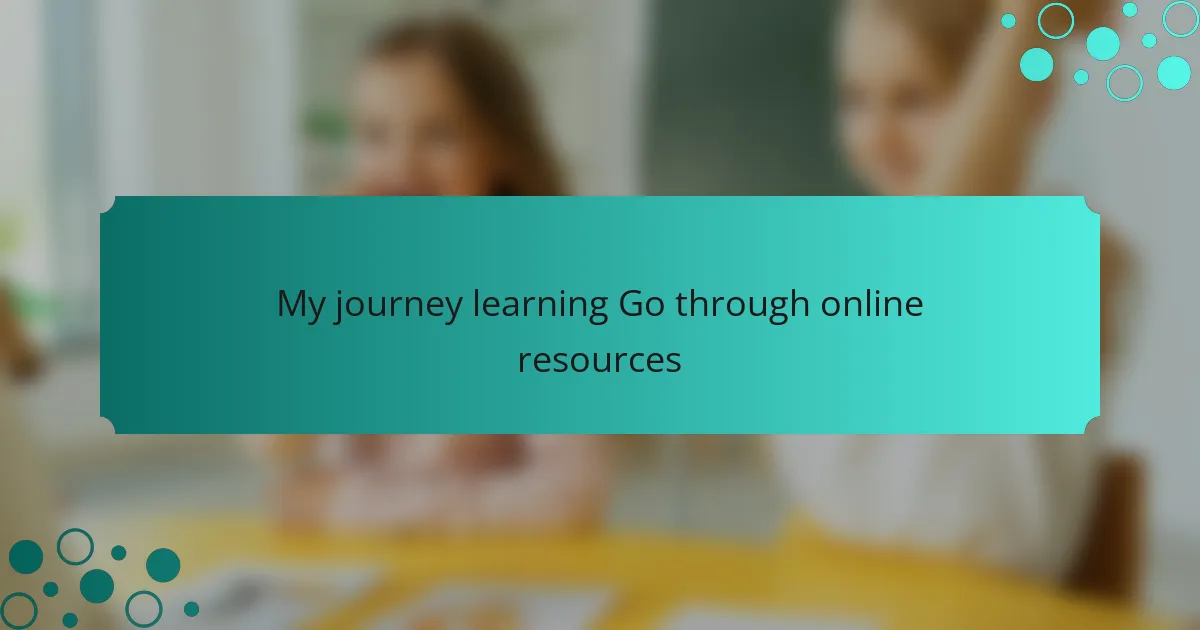Key takeaways
- The Go programming language, designed by Google, focuses on simplicity and concurrency, making coding more efficient and manageable.
- Learning Go online offers flexibility and access to diverse resources, including interactive tutorials and community support, enhancing the learning experience.
- Personal challenges during the learning journey, such as information overload and motivation dips, can be navigated through community engagement and breaking down concepts.
- Utilizing various online resources, like official documentation and video tutorials, can significantly boost one’s understanding of programming with Go.
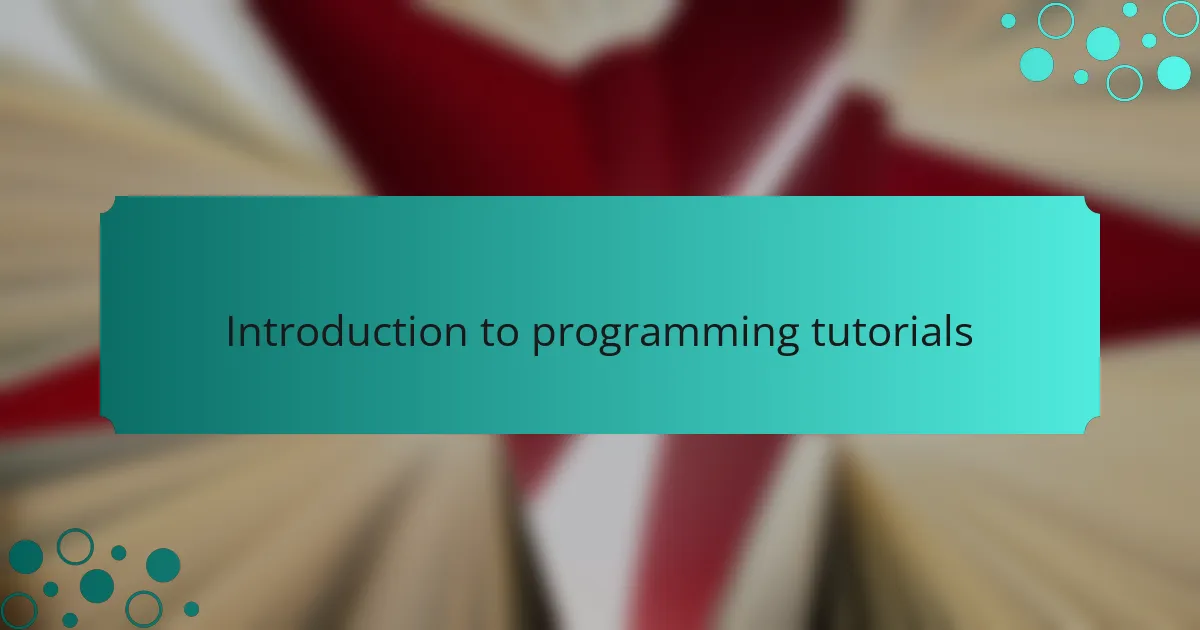
Introduction to programming tutorials
Diving into programming tutorials can feel overwhelming at first, can’t it? I remember my own experience—staring at lines of code that seemed like an alien language. But with the right tutorials, I found a way to bridge that gap between confusion and understanding.
As I explored various online resources, I discovered that learning to program is not just about mastering syntax; it’s about problem-solving and creativity. Each tutorial challenged me to think critically and approach weaknesses as opportunities for growth. Have you ever felt a spark of excitement when you finally understand a complex concept? That moment makes the journey worthwhile.
There’s a vast ocean of tutorials available today, catering to all learning styles, whether you prefer video lessons or text-based content. I often found myself gravitating towards interactive platforms, as they made the learning process engaging and fun. Isn’t it fascinating how teaching methods can shape our understanding and passion for programming?
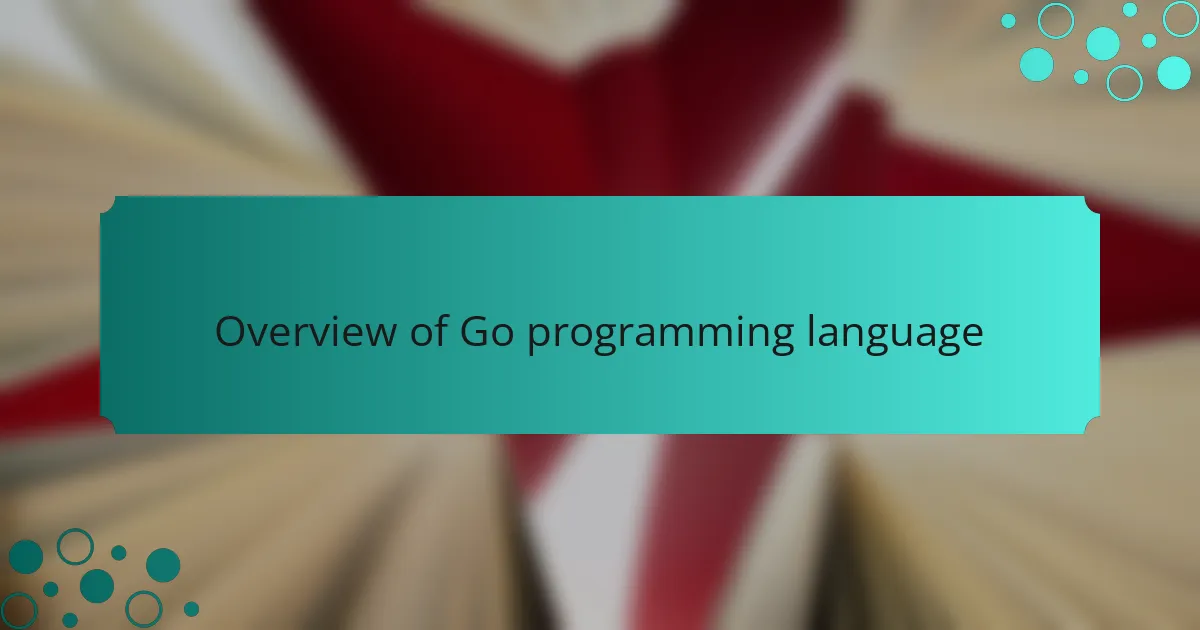
Overview of Go programming language
The Go programming language, often simply referred to as Golang, was designed by Google to simplify the process of software development. I remember hearing about its creation in 2007, driven by the desire to improve programming efficiency and performance—it’s like they took the best of everything and distilled it into a streamlined package. Have you ever used a tool that was so intuitive it felt like it was made just for you? That’s the essence of Go.
What really resonates with me about Go is its focus on concurrency, allowing developers to execute multiple tasks simultaneously without fuss. This is a game changer when working on modern applications that require responsiveness. I still recall the first time I implemented goroutines and realized how much easier they made managing processes—it was like discovering an entirely new dimension in coding.
Another standout feature is Go’s simplicity in syntax, which encourages clean and maintainable code. It reminds me of my early days learning programming, where I wished for clarity over complexity. This straightforwardness isn’t just a bonus; it fosters a sense of confidence in writing code. Don’t you just love the feeling of being able to focus more on solving problems rather than getting bogged down by complicated syntax? That’s one of Go’s greatest gifts to programmers.
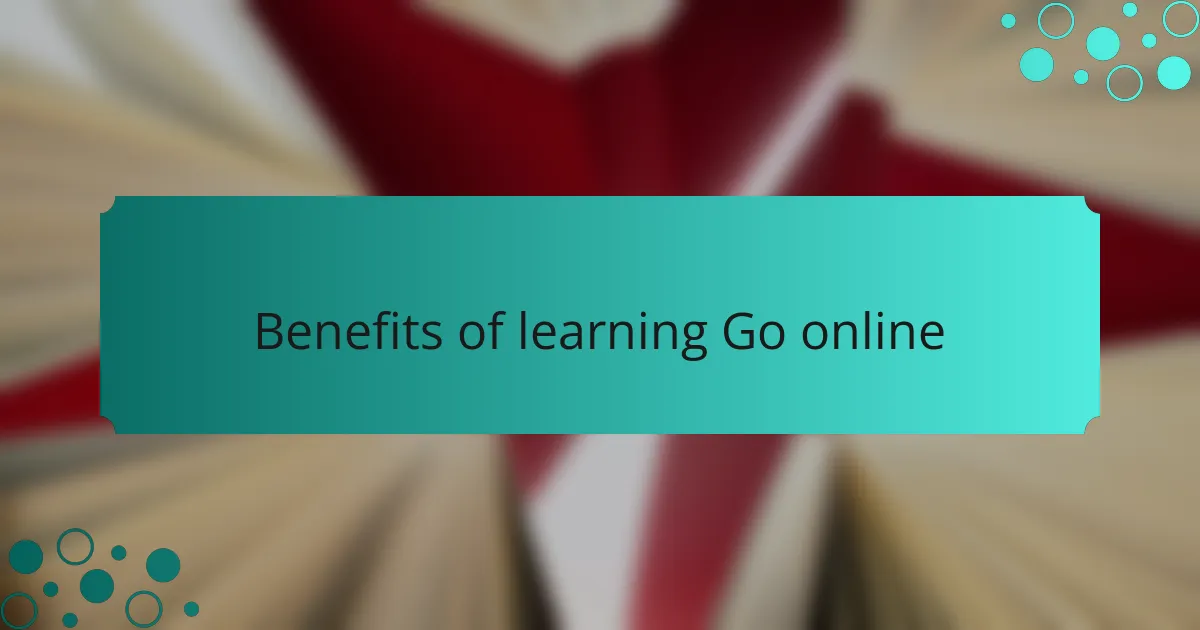
Benefits of learning Go online
Learning Go online offers incredible flexibility. I vividly remember my late nights, sipping coffee while absorbing tutorials at my own pace. This adaptability allowed me to tailor my learning experience around my schedule, ensuring I was both engaged and productive. Have you ever found that personal time in your learning can lead to deeper understanding? I certainly have.
One of the most rewarding aspects of online resources is the access to diverse learning materials. I often mixed and matched video lectures with hands-on coding exercises, which deepened my comprehension tremendously. It’s fascinating how different formats can resonate with us in unique ways. Have you noticed how sometimes a particular explanation just clicks, while others leave you scratching your head? That’s the beauty of variety!
Finally, the online Go community is simply outstanding. I recall joining forums and participating in discussions that brought me fresh perspectives. Not only did I gain knowledge, but I also made connections with fellow learners who inspired me to push my boundaries. Have you ever felt the support of a community buoy your efforts? There’s something motivating about knowing you’re part of a larger journey.
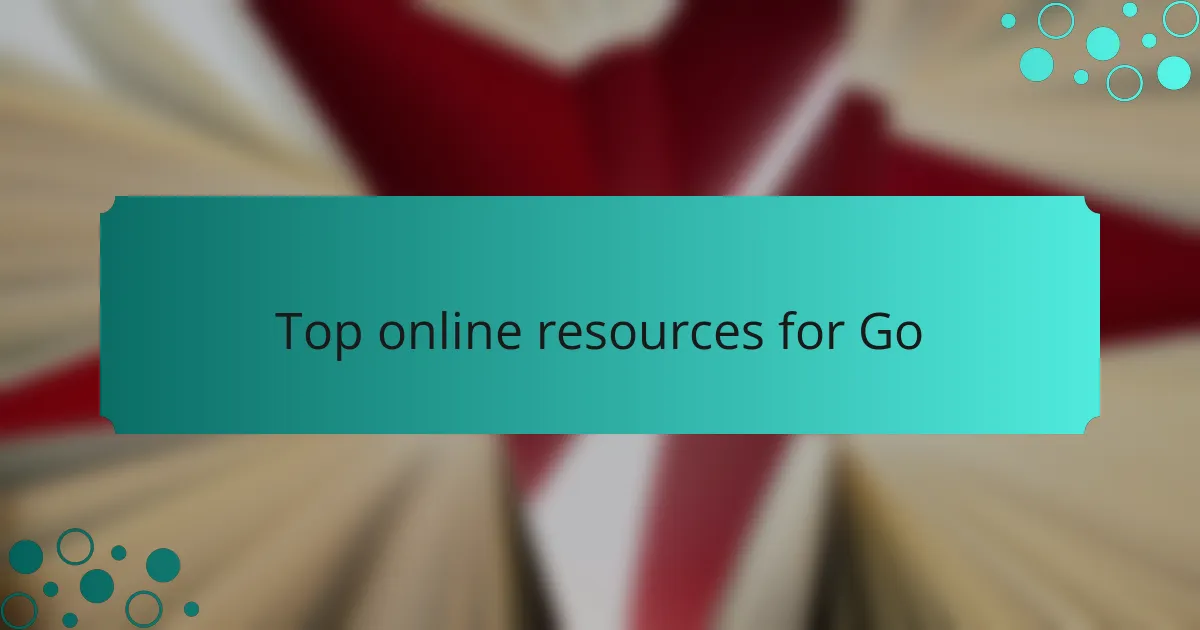
Top online resources for Go
Exploring online resources for learning Go has truly transformed my programming journey. I remember when I stumbled upon my first tutorial, and the clarity of Go’s syntax captivated me instantly. With numerous platforms available, it’s essential to choose resources that resonate with your learning style.
Here’s a list of some top online resources that have significantly aided my understanding of Go:
- Golang.org: The official Go website offers comprehensive documentation and tutorials that are great for beginners.
- Go by Example: This site presents practical code examples, making it easier to grasp concepts.
- Coursera: I took a course here that provided structured learning and peer support, which I found incredibly beneficial.
- Udemy: With various courses available, I often refer to highly-rated ones for in-depth topics.
- YouTube Channels: Channels like “JustForFunc” made learning fun and engaging through quick coding examples.
- GitHub Repositories: Exploring open-source Go projects has allowed me to see real-world applications of what I’ve learned, sparking my creativity.
Each of these resources has played a part in fueling my passion for Go. It’s exciting to see how they can also guide you on your path!
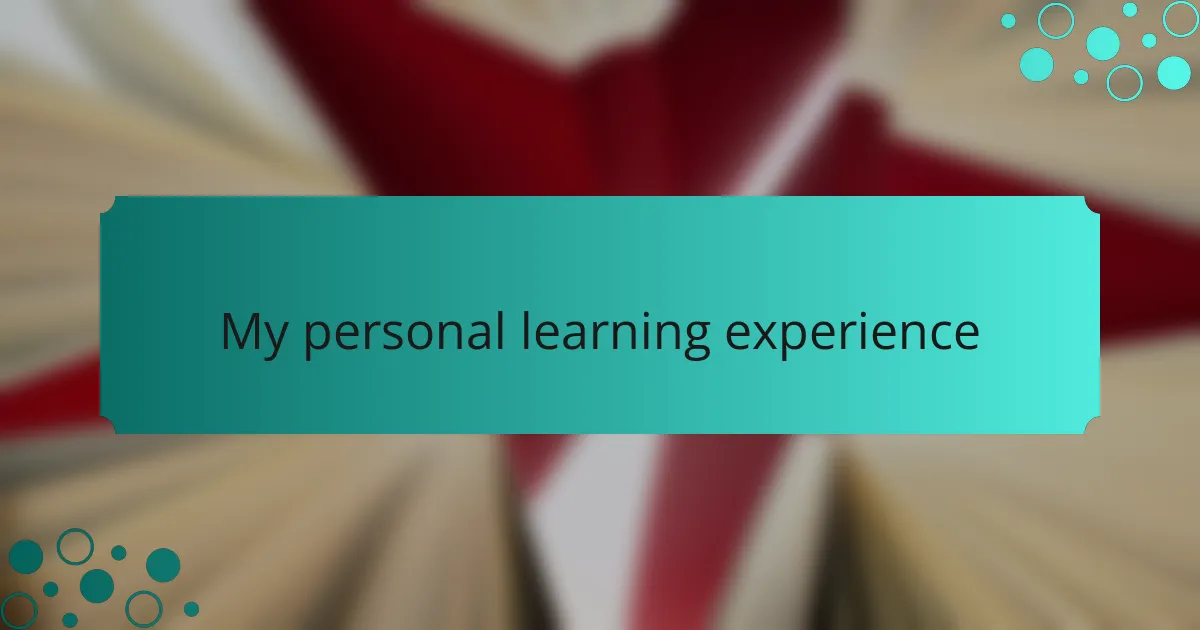
My personal learning experience
I’ve always found that my personal learning experience is shaped by the challenges and triumphs along the way. I remember when I first attempted coding in Go; each error message felt like a puzzle waiting to be solved. It was frustrating at times, but each little victory made those struggles worth it. Have you ever felt that rush of satisfaction when you finally fix a bug? It’s like winning a battle against your own doubts.
As I navigated different online resources, I discovered that not every tutorial fit my learning style. Some were too fast, while others went too slow, making the experience sometimes tedious. But as I honed in on what truly resonated with me, I began to appreciate the variety available. It reminded me of finding the right book that captures your imagination. Have you ever picked up a book that felt like it spoke directly to you? That’s the kind of connection I sought in my tutorials.
Reflecting on my journey, I realize that interaction with the community played a major role in my learning. I vividly recall joining a discussion thread about concurrency in Go and feeling a sense of camaraderie with fellow learners. Sharing our struggles and successes fostered an environment of growth. It made me wonder: how much richer would your experience be if you engaged with others exploring the same path? For me, it transformed my solitary learning into a shared adventure.
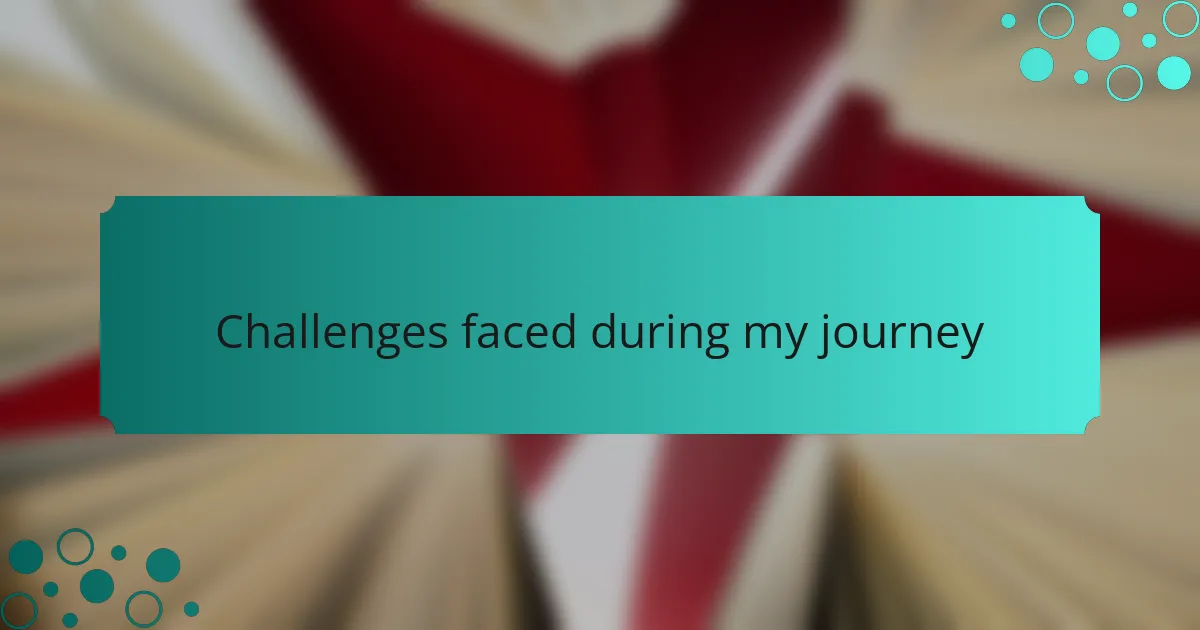
Challenges faced during my journey
During my journey of learning through online resources, I encountered numerous challenges. One of the most significant hurdles was dealing with overwhelming information. At times, I found myself drowning in countless tutorials, struggling to determine which ones truly suited my learning style. This often led to frustration as I navigated through differing opinions and methods.
Another challenge was maintaining motivation. I’ll never forget a point when I felt stuck on a concept for weeks. It was disheartening, but I learned to break problems down into smaller parts. This approach not only eased my stress but also rekindled my interest in programming.
Lastly, the lack of immediate feedback was daunting. I remember submitting my projects to online forums, anxious for critiques. I realized the importance of community, and that push from peers made a significant difference in my learning curve.
| Challenge | Personal Insight |
|---|---|
| Overwhelming Information | It was easy to feel lost amidst so many tutorials. |
| Maintaining Motivation | Breaking down concepts helped reignite my passion. |
| Lack of Immediate Feedback | Engaging with the community provided crucial support. |
